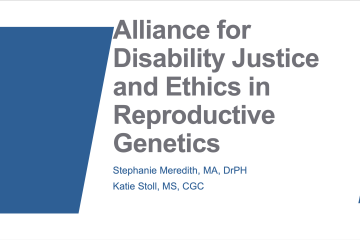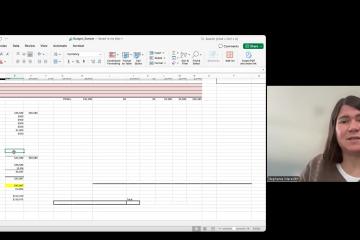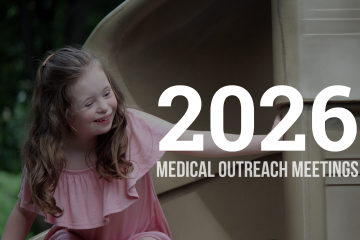Resources for Provider Outreach
Obstetricians and Gynecologists
American College of Osteopathic Obstetricians and Gynecologists (ACOOG): ACOOG is a somewhat smaller organization than ACOG with a smaller annual conference, often attended by very engaged osteopathic providers. In addition, their Director of Education is the father of a person with Down syndrome.
Society for Maternal-Fetal Medicine (SMFM): MFM providers care for complex pregnancies, so the SMFM annual conference is an excellent opportunity to reach providers directly caring for DS pregnancies.You can also search for MFM specialists in your area to reach out to individual MFM providers.
Association of Women’s Health, Obstetric and Neonatal Nurses (AWHONN): The AWHONN hosts an enormous annual conference and can help connect you with nurses caring for pregnancies or babies with Down syndrome in your area.
ACOG student interest groups: Here, you can directly reach out to student interests groups by email, establish a connection, and ask to present to them (e.g., with a parent panel) so they can learn about lived experiences.
Council on Resident Education in Obstetrics and Gynecology: Through this council, you can get involved in events and meetings to connect with residents in OB/GYN.
Genetics Providers
American College of Medical Genetics and Genomics (ACMG): The ACMG is the professional organization for geneticists, and has a directory where you can search for members and genetics clinics. Geneticists are few and far between and often only work in heavily populated cities. This means that even one geneticist interested in your work may well be the only geneticist seeing Down syndrome patients across a large region, making them an excellent contact.
National Society of Genetic Counselors (NSGC): Prenatal genetic counselors are often key providers for parents learning about a new or suspected Down syndrome diagnosis, and often have connections with pediatric Down syndrome providers. You can search for genetic counselors by speciality to find prenatal genetic counselor in your area.
Accreditation Counsel for Genetic Counselors (ACGC): Genetic counseling Program Directors are often highly motivated to present balanced information and lived experiences to their students. In addition, genetic counseling programs are often looking for connections with advocacy organizations so that second-year students can work on meaningful projects with local organizations for their research project requirement. You can use the ACGC search tool to find an accredited program in your area and reach out to their Program Director to see if your organization can work with their students.
Neonatologists
Neonatology Solutions: You can explore the Neonatal Solutions NICU Directory to find NICUs with the most beds and highest level of care. These are the best NICUs to target social workers and head nurses who care for families with a newborn with Down syndrome.
National Association of Perinatal Social Workers (NAPSW): Perinatal social workers are often your best contact at the NICU to reach families, and attending the NAPSW national conference is a great way to connect with perinatal social workers.
Pediatricians
American Academy of Pediatrics (AAP): AAP Guidelines (e.g., Health Supervision for Children and Adolescents With Down Syndrome) are very helpful to have on hand when approaching pediatricians. You can also look into the authors of Down syndrome guidelines (or any research relevant to your organization) to see if they are affiliated with a hospital or university in your area. If so, reach out!
Down Syndrome Clinics
You can find Down syndrome clinics near you using search tools through the National Down Syndrome Congress (NDSC) and the Global Down Syndrome Foundation.
Strategies for Provider Outreach
- Reach out to students: Students are often excited to learn from families and interested in getting involved in local organizations. Experiences at this stage can affect a lifetime of practice!
- Look for authors of papers: Use Google Scholar to look through publications on Down syndrome care, and connect with any authors near you.
- Exhibit: Table at national or regional conferences attended by medical providers.
- Look beyond doctors: Nurses, social workers, and prenatal genetic counselors are always great connections!
- Ask your own doctors: No matter the field of medicine, doctors will have connections with other medical providers, and may know someone who would be interested in your work.
- Ask medical professionals with children with genetic conditions: No matter the field of medicine, providers who have children with Down syndrome or other genetic conditions are likely to appreciate the work you do and may want to get involved.
- Snowball sampling: Find one person who is passionate about the work you do, and ask them to help connect you with others.
Down Syndrome Awareness/Acceptance Month Events!
We are so excited for an amazing month of events this October, including:
- Lettercase and Down Syndrome Pregnancy 20% off book sale
- Genetic Support Foundation Down Syndrome Awareness/Acceptance Month Fundraising Campaign
- Jack’s Basket You Make Me Better Gala
- 3.21 For Life Buddy Walk: Facebook, Instagram
- DSNMC Step UP Walk
- NCDSA Buddy Walk
You can also check out our new CODED: Genetics podcast on CRISPR and Down syndrome here or wherever you get your podcasts!


